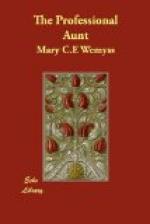Which I, of course, did. Really it was very careless of Miss Daly.
The children danced hard, with intervals for tea and refreshment; and as seven o’clock struck, there was a transformation scene. With conscientious punctuality the party-dressed children turned, into little or big woolen bundles, as the case might be. The last bundle I saw was a pink woolen one, weeping bitterly. My heart was wrung. The noisy crying of a child is bad enough, but when it is the soft weeping of a broken heart, it is unbearable. Of course it was my friend Thomas. I stood on the staircase unable to do anything, for he was quickly borne from the arms of Fraulein by a big footman, and no doubt deposited in a brougham in the outer darkness. Poor Thomas!
I hoped that the right sort of mother would be at home to unroll that pink bundle, a mother who would pretend that it could not be her darling who was crying, but a strange little boy with a face quite unknown to her. Where could he have come from? And so on, until Thomas would be ashamed to be seen with a strange face, and would smile, and then his mother would say, “What is it, my darling?” because, of course, it was her own darling who was crying, and she would never rest till she knew why.
I went back to the drawing-room quite happy that Thomas should be unrolled by the right sort of mother, and as I walked across the room, my foot slipped on something. I looked to see what it was I had trodden on. It was a short screw, Thomas’s precious possession. “That was why the poor pink bundle was crying!”
“Hyacinth,” I said, “who was Thomas?”
“Which one? There was little Thomas and the Thomas who lives a long way off, and then just plain Thomas.”
“I mean the fat little Thomas who danced so hard.”
“Oh! that’s the little Thomas,” said Hyacinth.
“Where does he live?” I asked.
“Oh, quite close; when we go to tea there we walk. He hasn’t got a mother, so there’s no drawing-room. She died,” added Hyacinth, as if it was an every-day occurrence that Thomas should be left without a mother, instead of its being a heart-breaking tragedy. A child with no mother, no mother to unwrap the pink bundle, no mother to grieve for the screw, no mother to understand things. Perhaps his mother had been a Diana sort of mother.
“Oh, Thomas,” I thought, “I must send you back your screw.” I didn’t care what any one said — he should have it.
If he had had a mother, it wouldn’t have mattered, because she would have known it was a screw he had lost, and she would have known just what comfort he would have needed; whereas a Fraulein would know nothing about a screw, beyond the German for it, and the gender, of course. And of what use is that to a child? It may sound very unconventional, and I suppose it was so, to go to a strange house and ask for Thomas, and my only excuse a small screw. But still I went!




